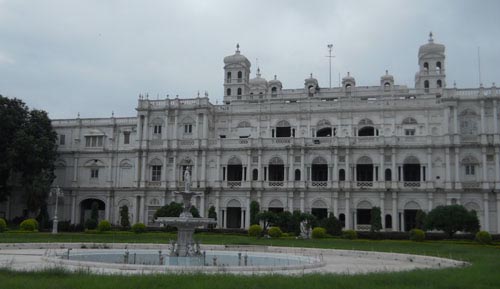Jai Vilas Palace

Information on Jai Vilas Palace (Gwalior, Madhya Pradesh) - History & Architecture
Jai Vilas Palace is popularly known as Jai Vilas Mahal. It is located in Jayandra Gang in the Lashkar area of Gwalior in the state of Madhya Pradesh in Central India. It was built in 1874 on a budget of 1 crore which is equivalent to now nearly $200 Million or 1200 Crore. It was established by H. H. Maharaja Jayaji Rao Scindia, the Maratha Maharaja of Gwalior. The size of the palace is about 12, 40,771 square feet. The architectural styles used in the making of this particular palace are Corinthian, Italian and Tuscan architecture. It is classified as a nineteenth-century palace in India. Till date, this palace is used as residence by the descendants and relatives of the former royal Maratha Scindia dynasty with a lot of perfection.
Jai Vilas Palace Architecture
The European architecture of the Jai Vilas Palace or Jai Vilas Mahal was well-designed and successfully built by Lt. Col. Sir Michael Filose who was popularly known as Mukhel Sahib under the direct guidance of H. H. Maharaja Jayaji Rao Scindia, the Maratha Maharaja of Gwalior, in order to welcome Edward VII. This palace has more than 400 rooms from which 40 rooms are exclusively transformed at present into Jiwaji Rao Scindia Museum by the state government. It is to be highly remembered that at Durbar Hall, two Belgian chandeliers weighing nearly 7 tonnes each are believed strongly by the experts to be most gigantic in the world. The Durbar Hall or royal court inside the palace is known for its interior decormation, unique architectural styles and sculptures. Most of the walls of the Halls and rooms are filled with stuffed heads of wild animals.
Jai Vilas Palace History
H. H. Maharaja Jayaji Rao Scindia established the Jai Vilas Palace as the residential place for the royal family to life and rule from there with a lot of perfection. It was master planned and constructed by Lt. Col. Sir Michael Filose who is known for his excellence in building engineering. This particular Palace has a good collection of furniture from France, Italy and Versailles. The main attraction is the two Belgian chandeliers weighing several tones. The museum housed in the palace displays its suitably eccentric collections of carriages, dining accoutrements, furniture, clothes, arms, sculpture, paintings and the most remarkable of which is a train made of silver in order to ferry liqueurs round the dinning table. It has unique historical significance and the things that are still preserved inside the museum and the Palace talks a lot about the glorious era, which was once lived in Jai Vilas Palace of Gwalior. It carries a historical significance which is even been talk and read in the history and will always continue to be the part of the time and the era of coming days.
Jai Vilas Palace Tourism Importance
The Jai Vilas Palace or Jai Vilas Mahal can be easily reached by local means of transport from the town of Gwalior. Domestic and foreign tourists can come across the historic sword of Shah Jahan and Aurangzeb of their ruling period, proudly hanging on the walls of the palace in the museum. You can really feel and experience the past glory unfolds in front of you while standing in this palace. This particular royal palace is one of a unique kind in India which speaks for itself the bygone era of the Indian history with a lot of perfection. The well maintained garden and recreation place in the surrounding the palace is the right spot to spend time with family members, close relatives and friends on a picnic.
- Andaman Nicobar Monuments
- Andhra Pradesh Monuments
- Assam Monuments
- Bihar Monuments
- Chhattisgarh Monuments
- New Delhi Monuments
- Goa Monuments
- Gujarat Monuments
- Haryana Monuments
- Himachal Pradesh Monuments
- Jammu and Kashmir Monuments
- Karnataka Monuments
- Kerala Monuments
- Madhya Pradesh Monuments
- Maharashtra Monuments
- Odisha Monuments
- Punjab Monuments
- Rajasthan Monuments
- Tamil Nadu Monuments
- Telangana Monuments
- Uttar Pradesh Monuments
- West Bengal Monuments